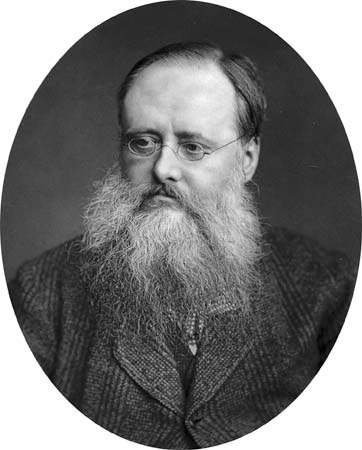Collins, Wilkie
British author
in full William Wilkie Collins
born Jan. 8, 1824, London, Eng.
died Sept. 23, 1889, London
 English sensation novelist, early master of the mystery story, and pioneer of detective fiction.
English sensation novelist, early master of the mystery story, and pioneer of detective fiction.The son of William Collins (1788–1847), the landscape painter, he developed a gift for inventing tales while still a schoolboy at a private boarding school. His first published work was a memoir to his father, who died in 1847, Memoirs of the Life of William Collins, Esq., R.A. (1848). His fiction followed shortly after: Antonina; or, the Fall of Rome (1850) and Basil (1852), a highly coloured tale of seduction and vengeance with a contemporary middle-class setting and passages of uncompromising realism. In 1851 he began an association with Dickens (Dickens, Charles) that exerted a formative influence on his career. Their admiration was mutual. Under Dickens' influence, Collins developed a talent for characterization, humour, and popular success, while the older writer's debt to Collins is evident in the more skillful and suspenseful plot structures of such novels as A Tale of Two Cities (1859) and Great Expectations (1860–61). Collins began contributing serials to Dickens' periodical Household Words, and his first major work, The Woman in White (1860), appeared in Dickens' All the Year Round. Among his most successful subsequent books were No Name (1862), Armadale (1866), and The Moonstone (1868). A master of intricate plot construction and ingenious narrative technique, Collins turned in his later career from sensation fiction to fiction with a purpose, attacking the marriage laws in Man and Wife (1870) and vivisection in Heart and Science (1883).
Additional Reading
Sue Lonoff, Wilkie Collins and His Victorian Readers (1982).
- golden chain
- golden cup
- golden eagle
- goldeneye
- Golden Fleece, The Order of the
- Golden Gate
- Golden Gate Bridge
- Golden Gate Highlands National Park
- Golden Gloves
- golden hamster
- Golden Horde
- Golden House of Nero
- golden larch
- golden mole
- golden number
- goldenrain tree
- golden ratio
- golden retriever
- goldenrod
- golden rose
- Golden Rule
- goldenseal
- Golden Spike National Historic Site
- Golden Spurs, Battle of the
- Golden Thirteen